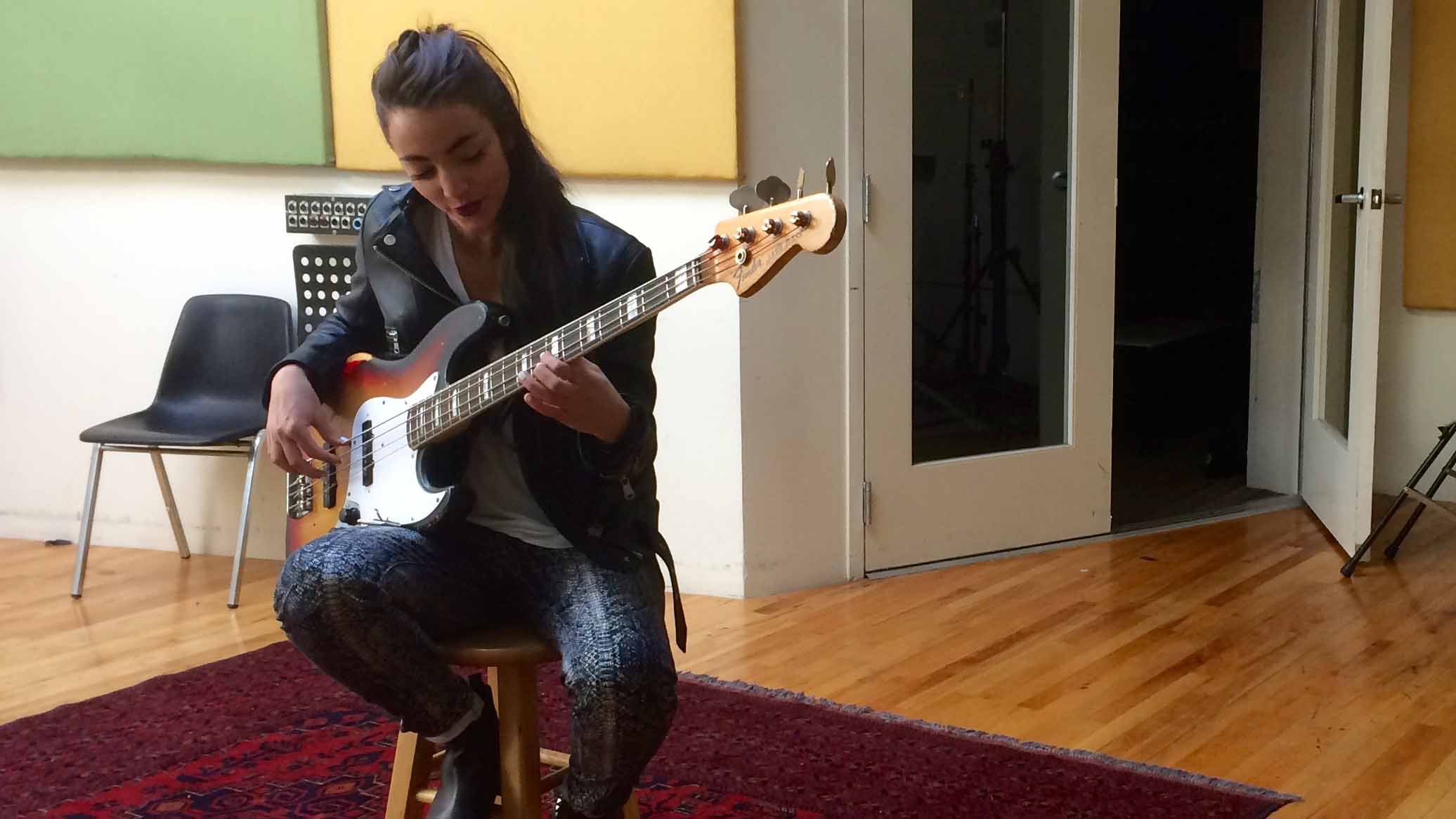Alissia Benveniste's top 5 tips for bassists
Funk bass prodigy on technique and playing live

Introduction
Berklee College of Music is synonymous with legendary musicians – Al Di Meola, John Mayer, Steve Vai and John Myung, to name a few – and mark our words, funk bass supremo Alissia Benveniste is set to become another standout on the alumni list.
Working with 14-piece band The Funkateers, Alissia blends classic Parliament-ary funk with Prince-ly hooks, not to mention a slap and pop technique worthy of messrs Victor Wooten and Marcus Miller.
As she preps her excellently named Back To The Funkture EP for release on 29 January 2016, Alissia shared a few pearls of wisdom on how to become an ace of bass…
Don't Miss
Marcus Miller's top 5 tips for bassists

1. Study the greats carefully
“From Jaco Pastorius to James Jamerson to Larry Graham to Pino Palladino, it's very important to study what made history in the bass world.
“Bass players often forget to really master the bass itself before playing. Be sure to really dig in to the past and understand where they got that from, what their influences were to really be able to take from each and create your own sound.
“People will respect you and know instantly that you've done your research when you're playing. Study the albums that the greats have played on and analyse them; be thorough and look at each and every detail: where on the bass did they play this note? What string did they play this note on? How long? Did they slide to get to the note? Did they play the octave here? Was it fingerstyle or muted?
“All these details and more are things you should really ask yourself moreso than just transcribing the actual notes and lengths. This is something I still do every day and something I'm still learning!
“The beauty of playing bass is that the study never ends; there is always something to learn or an album you just found out about that no-one ever heard that is killer! Be patient and curious, always stay creative and hungry to learn more.”

2. Build your repertoire
“It's very important as bass players to have repertoire. Unless you're a solo six-string artist, our job is to make sure the band has low-end support and groove. That's exactly what we should spend most of our time on to really master it.
“When we play in a live context with other musicians, they'll say: 'let's play that tune!' In order to look professional, you should be able to instantly say, 'Okay, let's do it!' and not 'Um… how does it go again? What key is that in?'
“The fact that you have a repertoire shows that you've done your studies and you're ready to play! Of course, it's impossible to know every song, but try to really learn the most well-known ones and, if possible, also well-known albums.
“Right now, I'm actually working on building a list of albums that I know; if I realise I don't know some songs on that album, I will make sure to learn them. Try to do this, too! It will not only expand your repertoire but also you will learn more bass language.
“Be as flexible in the style of music as possible – try some jazz, try some pop, try some gospel, try some rock. Give yourself a timeframe if you wish; that could help you, and it's fun at the same time!”

3. Play live as much as possible, with other musicians
“Nowadays, we tend to stay home and practise to a metronome. Well, you'll never play a live show as a duo with a metronome, so try to play with other musicians as much as possible.
“When I first started to play bass, I practised a lot at home but also had two weekly four-hour gigs. I can really say that this was where I learned most.
“Trying to really lock in with a drummer, listening to the singer without overstepping their space, listening to the guitar player and playing with them and not against their rhythmic ideas, or even listening to the keyboard player and what chords they choose to play: all of these are things you can only experience in a live setting.
“Playing live with musicians is, to me, one of the most inspiring things to do: each and every one in the band puts some ideas in and it's all about being in unity and sounding good all together. Learning not to overplay and really play the groove is also key!”

4. Study different styles but keep your own sound
“What if you get a call from a huge metal/rock artist, would you take it? What if you get a call from a country/folk Artist, would you take it? And what if you would get a call from a gospel artist, would you take that, too?
“Your answer should be yes to all the above! As bass players, we need to be flexible. It's important that we study different techniques and styles in order to be a complete professional bass player – from being able to take a Stanley Clarke slap solo to playing simple Pino Palladino groove basslines and walking a blues!
“In order to do so, it's also important that you keep your original sound so that people recognise you for that. People usually call a certain bass player for their sound and for their bass knowledge.”

5. Networking is key
“I know so many incredibly talented musicians who are closed in their practice rooms and no-one knows about them – this really drives me crazy since we really don't have any excuses nowadays with social media at our fingertips; we should be able to share our talent with the world!
“No-one will knock at your door and say, 'Hey do you want to come on tour with us?' without hearing about you first. It's really important to have a clear image and promote it.
“Always remember that no-one can do what you do. We are all unique human beings and all have something to offer – show the world what you can offer!”
Don't Miss
Marcus Miller's top 5 tips for bassists
Mike has been Editor-in-Chief of GuitarWorld.com since 2019, and an offset fiend and recovering pedal addict for far longer. He has a master's degree in journalism from Cardiff University, and 15 years' experience writing and editing for guitar publications including MusicRadar, Total Guitar and Guitarist, as well as 20 years of recording and live experience in original and function bands. During his career, he has interviewed the likes of John Frusciante, Chris Cornell, Tom Morello, Matt Bellamy, Kirk Hammett, Jerry Cantrell, Joe Satriani, Tom DeLonge, Radiohead's Ed O'Brien, Polyphia, Tosin Abasi, Yvette Young and many more. His writing also appears in the The Cambridge Companion to the Electric Guitar. In his free time, you'll find him making progressive instrumental rock as Maebe.
